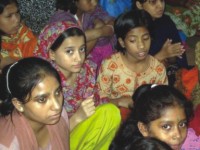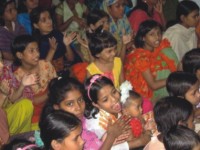|
Endeavour
Starting Over
Andrew Morris
Looking around the room, you could be in any school cultural show in Bangladesh. There
 |
Young survivors at the shelter: trying to forget the past and moving on |
are cheering kids, teenagers and young women in colourful clothes singing and clapping at the spectacle of music, dance and song playing out in front of them, as their teachers look on. Laughter fills the air, especially when I try my hand at dancing with the performers. But this is no ordinary group of women and children. I have come to a shelter hostel run by Bangladesh National Women Lawyers Association (BNWLA) and each person in front of me has a harrowing tale of exploitation, trauma or neglect to tell. Fittingly, the day I have chosen to visit is also the UN International day for the Elimination of Violence against Women, and this festive celebration is a forceful assertion of these survivors' dignity, their rights and their desire to claw back a normal life from the suffering they have experienced.
According to the Executive Director of BNWLA, Advocate Salma Ali, the aim of the hostel (primarily funded by Save the Children Denmark/Sweden) is to provide shelter for women and children whose legal cases are still pending. This is particularly necessary in a context where there is no witness protection law, and little offered by the state in the way of support for victims of violence and trauma, whose families are often unable or, in some cases, unwilling to help. The hostel, along with similar shelters run by a variety of NGOs, exists, Salma Ali explains, “to provide a basic healthy women- and child-friendly atmosphere in which the survivors can improve their physical and mental well-being, prior to their integration into society”. Caring professionals staff it: doctors, child protection officers, counsellors, supervisors and 'house mothers' whose affection for and commitment to the welfare of their charges is plain to see.
It's a simple building, hardly luxurious, (it's actually a rented old people's home) but secure, neat and clean, and providing an appropriate environment for a smoother transition back to the survivors' former lives: most are from economically disadvantaged backgrounds. It's also where Madhabi and Mahmuda, whose stories of domestic servitude and trafficking are familiar to SWM readers, are in temporary accommodation. The average stay here is six months, although there are abandoned children who stay longer, until they are reclaimed by their families. Other women whose return to their homes is impossible may be referred to longer-term hostels and training centres, such as that run by SOS.
 |
Survivors sing at a programme at the shelter comommonding the UN International Day for the Elimination of violence against women |
So what are the stories hidden inside these young people? Here, for example, is S., now 25, who was married off to a much older man, but unable to provide a dowry. One day, after she had undertaken a journey back home to her parents without her husband's permission, he threw acid in her face, leaving her disfigured for life. She was hospitalised immediately, but had no money for treatment. BNWLA provided legal aid, and her husband was eventually convicted. She plans to become a cook and is learning the skill at the hostel.
Next to her is M., 13-years-old, from a large family in Dhaka. Raped at knifepoint by a 55-year-old neighbour when her parents and siblings were out of the house, she was initially consumed by feelings of shame, aware that society's attitudes to her pregnancy would be unforgiving as in so many cultures. Plucking up the courage to tell her story, her case eventually came to light. A local judge ordered compensation, but the culprit refused to pay. M's father initially wanted to drop the case, the defendant being a powerful local man, but they finally secured enough legal support for a conviction. M. is now at the hostel learning to sew.
T. is a boy of 15, originally drawn to the capital by the allure of work and the promises of his stepsister. Little did he know that she would promptly sell him into servitude. Through a complex network of middlemen he was quickly whisked out of the country to India and then on to Dubai into the dangerous world of camel-racing for the pleasure of the Sheikhs. When, three years later, he'd grown taller and therefore outlived his usefulness, he was flown back and dumped without support on the city streets, picked up by the police, and subsequently thrown into jail. He was later rescued and brought to the shelter, where he is receiving training in banner writing, practising dance, and exercising junior leadership roles within child-based NGO programmes.
K., on the other hand, is an orphan of 13. An avid reader as a child, her grandmother enrolled her in class two at a local school. On her way out of class one day she managed to miss her uncle waiting for her and then wandered off into the city, finally ending up in tears at the gates of a park she'd never seen before. A stranger spotted her and immediately enlisted her into his garbage collection operation, where she was forced to work for many months. Eventually, seeing her cry every day, he relented and delivered her over to the authorities, who transferred her to the shelter home. Now she is back in school and plans to be a doctor or an engineer.
Discussing such cases later with Salma Ali, she illustrates the psychological impact of their stories on these women and children by picking up a sheet of paper and tearing it into pieces. “How easy is it to make a whole sheet again out of these fragments?” she asks. Children may recover more quickly, but for teenagers and young women the scarring can be long-term.
 |
The residents of the shelter all have traumatic stories to tell but have found a way to look forward to their future |
Nevertheless, you will not find an atmosphere of self-pity here in the hostel. The focus is very much on reintegration and providing a fresh start, a second chance, through the provision of precisely the kind of counselling, education and skills training these survivors have received. In addition many survivors are encouraged to take on responsibilities with action groups and are in some cases even offered work at BNWLA.
To facilitate this reintegration, parents and guardians are welcome to visit, stay over, and forge renewed bonds with survivors. However, it can be a challenge even for family members to accept that these women and children are victims of circumstance and not themselves culpable. Social attitudes are deep-rooted, and stigma is hard to eradicate. In parts of the country where child marriage, domestic violence and polygamy are common, empathy for victims is not always the first response to suffering.
Reintegration, however, is a long-term goal and goes beyond merely delivering these individual survivors back into their communities. Further support is offered by community care committees chaired by responsible local women, whose members include amongst others, housewives, teachers, businessmen and imams. The emphasis is equally on the education of society at large: there are frequent parents' meetings, and a range of advocacy programmes raising awareness of women's and children's rights at local level.
Salma Ali is confident that the tide is slowly turning. “Even though we are fighting a long campaign, against people's greed, their willingness to exploit the vulnerable, corruption, crime syndicates and even police involvement,” she says, “I am hoping to see a society in which, one day, these hostels will no longer be necessary.” It's a long and arduous journey, which all those involved are undertaking with self-effacing dedication. They deserve our admiration and our total support.
Photo credit: Andrew Morris
The writer can be contracted through the Star Weekend Magazine.
Copyright (R) thedailystar.net 2006 |
